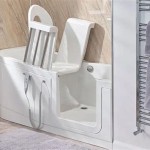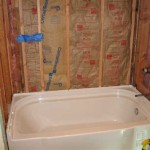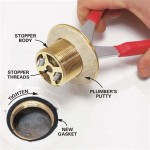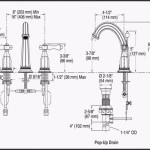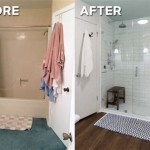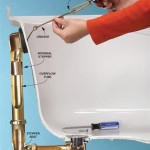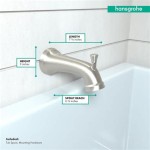Bathtub Shower Door Ideas: Enhancing Functionality and Aesthetics
Bathtub shower doors represent a pivotal design element in bathrooms, impacting both functionality and visual appeal. The selection process requires careful consideration of factors such as bathroom size, budget, and desired aesthetic. Various types of bathtub shower doors exist, each offering distinct advantages and disadvantages. Understanding these options is essential for making an informed decision that complements the overall bathroom design.
Traditional shower curtains, while economical, often fall short in maintaining water within the bathing area and can contribute to mildew growth. Bathtub shower doors offer a more refined and effective solution by providing a secure barrier that prevents water from escaping, thereby minimizing potential water damage and maintaining a cleaner, drier bathroom environment. Furthermore, shower doors contribute to a more sophisticated and polished aesthetic, enhancing the overall value and appeal of the bathroom.
Framed vs. Frameless Shower Doors
One of the primary distinctions among bathtub shower doors lies in the presence or absence of a frame. Framed shower doors typically feature metal framing around the glass panels, offering increased structural support and often a more budget-friendly option. The frames are usually constructed from aluminum or stainless steel, providing durability and resistance to corrosion. The framing system encloses the glass, making it easier to install and providing a more robust barrier against leaks.
However, the frames can also present certain drawbacks. The metal framework can accumulate soap scum and require more frequent cleaning to maintain a pristine appearance. Furthermore, the frames can sometimes appear visually bulky, potentially making a smaller bathroom feel even more confined. The style options with framed doors can be limited by the frame design.
Frameless shower doors, conversely, offer a more modern and minimalist aesthetic. These doors utilize thicker glass, typically tempered, to ensure structural integrity without the need for surrounding frames. The absence of framing creates a seamless and open appearance, allowing more light to enter the shower area and making the bathroom feel more spacious. The clean lines of frameless doors contribute to a sleek and contemporary look.
The installation of frameless shower doors often requires greater precision and skill due to the need for precise measurements and secure mounting hardware. The thicker glass and specialized hardware also translate to a higher cost compared to framed options. While the frameless design minimizes areas where soap scum can accumulate, the glass itself still requires routine cleaning to prevent water spots and maintain clarity.
Types of Bathtub Shower Door Configurations
Beyond the framing, bathtub shower doors come in a variety of configurations, each optimized for different bathroom layouts and personal preferences. The choice of configuration directly impacts the accessibility and functionality of the shower area.
Sliding shower doors, also known as bypass doors, consist of two or more panels that slide horizontally past each other along a track. This configuration is particularly well-suited for smaller bathrooms where swinging doors would obstruct the surrounding space. Sliding doors provide easy access to the shower area without requiring extra clearance. The overlapping panels ensure a watertight seal, preventing water from escaping. Regular cleaning of the track is necessary to maintain smooth operation and prevent the buildup of soap scum and debris.
Hinged shower doors, also referred to as swing doors, operate like a traditional door, swinging inward or outward on hinges. These doors offer a wide opening for easy entry and exit. Hinged doors are a popular choice for larger bathrooms where space is not a constraint. The style of hinges can vary from ornate to sleek, complementing the overall bathroom design. Careful consideration must be given to the swing direction to ensure it does not interfere with other bathroom fixtures or create a safety hazard. Ample space around the shower area is essential to accommodate the door's swing radius.
Folding shower doors, also known as bifold doors, consist of panels that fold inward, similar to an accordion. This configuration is a versatile option that can be adapted to various bathroom sizes. Folding doors offer a wider opening than sliding doors while requiring less clearance than hinged doors. The folding mechanism allows for flexible access to the shower area. The multiple panels and hinges can present more cleaning challenges compared to simpler door designs. The folding action can also feel less substantial than the operation of sliding or hinged doors.
Pivot shower doors rotate on a pivot point, typically located at the top and bottom of the door. This configuration offers a unique and stylish alternative to traditional hinged doors. Pivot doors can swing in either direction, providing flexibility in terms of entry and exit. The pivot mechanism requires careful installation to ensure smooth and reliable operation. Pivot doors are often used in modern bathroom designs, adding a touch of architectural interest. Like hinged doors, sufficient space around the shower area is necessary to accommodate the door's swing radius.
Material Considerations: Glass, Frame, and Hardware
The materials used in bathtub shower doors significantly impact their durability, aesthetics, and maintenance requirements. Selecting the appropriate materials requires balancing cost considerations with performance expectations.
Glass is the primary material for shower door panels. Tempered glass is the industry standard due to its safety characteristics. When broken, tempered glass shatters into small, relatively harmless pieces, minimizing the risk of serious injury. Tempered glass is also more resistant to breakage than standard glass. Glass thickness is a critical factor, particularly for frameless doors. Thicker glass provides greater structural stability and a more substantial feel. Glass can also be treated with special coatings that repel water and reduce the buildup of soap scum, simplifying cleaning efforts.
The frame materials, typically used in framed shower doors, are often aluminum or stainless steel. Aluminum is a lightweight and cost-effective option, but it can be more susceptible to corrosion over time. Stainless steel offers superior corrosion resistance and durability, making it a better choice for high-moisture environments. The frame finish, such as brushed nickel, chrome, or oil-rubbed bronze, can be chosen to complement the other bathroom fixtures. Regular cleaning of the frame is necessary to prevent the accumulation of soap scum and water spots.
Hardware, including hinges, handles, and shower door pulls, plays a critical role in both the functionality and aesthetics of the shower door. High-quality hardware ensures smooth operation and long-lasting performance. The hardware finish should match the frame finish or other bathroom fixtures to create a cohesive look. Stainless steel hardware is a durable and corrosion-resistant option. The design of the hardware can range from traditional to contemporary, complementing the overall bathroom style. Proper installation and maintenance of the hardware are essential to prevent premature wear and ensure smooth operation.
Beyond these typical materials, acrylic panels can be used as a cost effective, lightweight alternative to glass. These panels, however, often lack the aesthetic appeal and durability of glass. While less expensive, they are more prone to scratching and can yellow over time, reducing the overall visual quality of the shower enclosure.
In addition to the material itself, coatings applied to the glass can significantly affect the ease of maintenance. Water-repellent coatings can reduce the amount of water that adheres to the glass, minimizing water spots and soap scum buildup. This not only keeps the shower door looking cleaner for longer, but also reduces the frequency and intensity of cleaning required. Coatings should be applied according to the manufacturer's instructions to ensure optimal performance and longevity.
Choosing the right bathtub shower door requires careful consideration of space constraints, budget limitations, and personal aesthetic preferences. The decision involves evaluating the advantages and disadvantages of framed versus frameless options, selecting the appropriate door configuration, and choosing durable and aesthetically pleasing materials. By carefully weighing these factors, homeowners can select a bathtub shower door that enhances the functionality and visual appeal of their bathroom.

Enchanting Frameless Glass Shower Door For Small Bathroom Ideas Simple S Design Tub Combo

Understanding Glass Shower Doors For Your Tub

4 Best Shower Doors For Bath Tubs In 2024 Glass Genius

Tub Shower Doors In Naples Fl

Design Your Bathroom With Glass Bathtub Doors Manan Nj Showerman Com

Showers Tub Glass For Guest Bathroom Frameless Shower Enclosures

4 Innovative Bathtub Door Designs To Transform Your Bathroom Pioneer Glass

Frameless Panel Door On A Tub Glass To Hinge Brushed Nickel Finish Clear Bathtub Remodel Bathroom Shower Doors

Dreamline Mirage X 60x58 Right Sliding Bathtub Shower Door With Clear Glass In Brushed Nickel Tilebar Com

20 Bathroom Tile Ideas That Will Never Fail Bathtub Shower Combo Tub Doors
Related Posts

